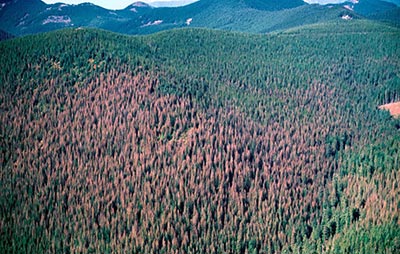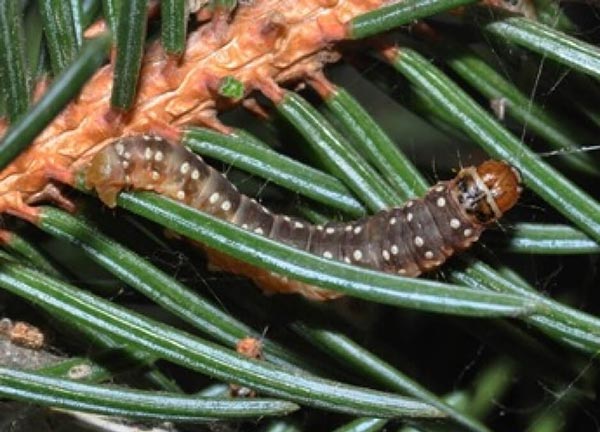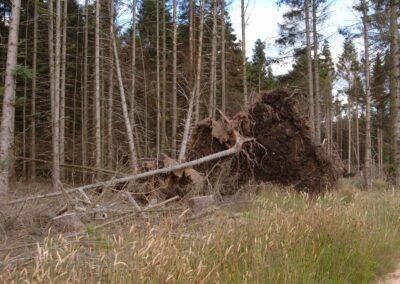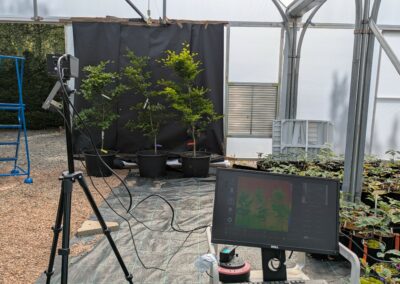Horizon scanning for tree health
Project leads Katy Dainton, Dr Daegan Inward | Forest Research
Lead organisation Forest Research
Collaborator The Canadian Forest Service
Project status Pilot year project complete
Project funding £68,000
Research outcomes Resistance I Response I Adaptation
Context
British forestry is highly reliant upon non-native tree species, with two-thirds of conifer plantations consisting of species which originate from coastal western North America, most notably Sitka spruce (Picea sitchensis) and Douglas fir (Pseudotsuga menziesii). These are critical species for storing carbon, new woodland creation, and commercial softwood production. Identifying potential future threats to these trees is critical to ensure future forest health and to inform new tree planting schemes.
Most plantations have remained largely free of pests and diseases until recently, but the newly introduced larger eight-toothed European spruce bark beetle (Ips typographus) and a disease caused by the pathogen Phytopthora pluvialis are currently a problem. The threat of pests and diseases is made worse by both climate change and by creating plantations of trees of the same age and a single species.
Today there is a worldwide pool of potentially damaging organisms that could enter the UK, so robust “horizon scanning” (HS) methods are needed to predict future risks. A completed Centre for Forest Protection pilot project highlighted that existing methods are limited in their ability to reliably identify future threats to a particular tree species.
Limitations include failure to use local-scale future climate projection data, which provides data on changes in growing conditions, and risks such as increased drought and climatic suitability for the pest/pathogen. There is also an overreliance on professional judgement and traditional pest risk assessment by experts.
Research aims and objectives
Aim:
- Develop a framework for horizon scanning that is innovative, data-driven, and future-focused, which can be applied to other species, including native British species growing in other parts of the world.
Objectives:
- Evaluate existing published horizon scanning approaches for their advantages and limitations.
- Evaluate other risk analysis or biosecurity modelling studies, that can be incorporated into a more targeted analysis for key tree species.
- Identify the data and tools that are available to support HS methods for identifying threats, including pests and diseases, to British grown trees.
- Investigate and determine the value of a collaborative international approach.
Main findings
The rapid review of existing horizon scanning and modelling approaches has identified a range of potential methods and assessed them for gaps and opportunities. We have proposed a framework for a robust, data-driven horizon scanning approach that takes greater account of changing climate and rich, detailed data sources, and recommended a practical workflow for an assessment for Sitka spruce and Douglas-fir.
The project identified opportunities for transdisciplinary research and international collaborative working to tackle forest health issues that cross borders.
Further resources linked to this project
Pilot Summary Report
British forestry is highly reliant upon non-native tree species such as Sitka spruce and Douglas-fir which originate from western North America. However, non-native trees may be at risk from native pests and diseases, the threats of which can be intensified by climate change. There is, therefore, an urgent need to develop approaches for identifying potential new threats, to inform new tree planting schemes and ensure future forest health.
This project aimed to develop an innovative, data-driven horizon scanning framework for identifying threats to key tree species growing in Britain. The approach could also be extended to other species, including native British species growing in other parts of the world.

Aerial view of defoliation by the western spruce budworm in Mount Hood National Forest.
Glossary & Key Terms
Biosecurity modelling
The use of data-driven analytical frameworks and predictive tools to assess and anticipate risks posed by pests, diseases, and environmental stressors to tree species.
Douglas fir (Pseudotsuga menziesii)
Douglas-fir is one of the most economically important conifers in the Pacific northwest. Despite its common name Douglas-fir was discovered by Archibald Menzies in 1793 and introduced to Britain by David Douglas in 1872. Initially planted as estate specimens it is now mainly planted for commercial forestry. Some of the heritage specimens are now the tallest trees in Britain with examples reaching over 66 m in height. Douglas-fir is categorised as a principal tree species. For more information, see Douglas fir (DF) – Forest Research.
Larger eight-toothed European spruce bark beetle (Ips typographus)
The larger eight-toothed European spruce bark beetle is a destructive pest of spruce trees (trees in the Picea genus) as well as some tree species in other conifer genera. For more information, see Larger eight-toothed European spruce bark beetle (Ips typographus) – Forest Research.
Pathogen
An organism or agent that can cause disease. Pathogens include viruses, bacteria, fungi, and protists. They can infect a wide range of hosts, including plants and animals.
Phytophthora pluvialis
Phytophthora pluvialis is a fungus-like pathogen known to affect a variety of trees including western hemlock, tanoak, pine (Pinus radiata, Pinus patula and Pinus strobus) and Douglas fir. It was originally reported in Oregon, USA in 2013 on tanoak and Douglas fir and was subsequently identified as the pathogen responsible for ‘red needle cast’ of radiata pine in New Zealand. Phytophthora pluvialis was discovered in a woodland in Cornwall in September 2021, where it was found to be affecting mature western hemlock and Douglas fir trees. For more information, see Phytophthora pluvialis – Forest Research.
Sitka spruce (Picea sitchensis)
Sitka spruce is the largest of the spruce Genus (Picea) with some trees growing to a height of 80 m and a dbh of 500 cm. It is Britain’s most widely planted productive conifer growing in the milder wetter conditions of the west and north. Sitka spruce is categorised as a principal tree species. For more information, see Sitka spruce (SS) – Forest Research.
Share this project on social media
Related Projects
Our Partners
Social media
Explore
Newsletter
Contact
© 2022 Centre for Forest Protection. All rights reserved.


